#Like I want to be free of subjectivity in diegetic context when I am watching TV no matter how hard the show tries
Explore tagged Tumblr posts
Text
Season 3 Sex Education is segue-ing into Current Events and ripped-from-the-headlines topical plots about Moral Panic re: LGBT Social Contagion and I keep having to pause because I hate being interpellated as a marginalized subject by a television narrative, I am watching this for ESCAPISM >:(
#When I'm watching TV I want to be like the dog crossing the Romanian border being clapped for as a symbol of entry into the Schengen zone#Yet unable to conceive of itself as a subject interpellated into the European border regime because it is a dog#Like I want to be free of subjectivity in diegetic context when I am watching TV no matter how hard the show tries#Well not always but when it is directly about The Transgender Craze Seducing Our Daughters. Yeah
13 notes
·
View notes
Text
Cold War (2018) | Directed and Written by Pawel Pawlikowski
Before getting into Cold War, as a prelude, I’d like to mention a funny documentary the filmmaker Pawel Pawlikowski released back in 1991 called Dostoevsky’s Travels. It follows the great-grandson of the famous Russian writer Fyodor Dostoevsky who died in 1881. Fyodor is generally known as one of the greatest writers of all-time and possibly one of the first modern psychologists, deeply probing the human soul in his work. Great-grandson Dmitri drives a tram in Leningrad, Russia and agrees to go on a speaking tour about his “prophet” Grandfather. He doesn’t do this to pay his respects, but only because he dreams of scraping together enough money to buy a used Mercedes to impress his friends. And he is OBSESSED with buying a Mercedes and knows nothing about his Great-Grandfather. He talks to crowds of intellectuals and hardly has anything to say about his kin Fyodor and just wants to get paid. He buys one Mercedes and it breaks down immediately. He then buys another at the end of the documentary and it gets stolen by bandits. As the doc progresses you see Dmitri is a bit of a numb-skull and a scoundrel. I liked it due to the irony of Dmitiri’s complete uncaring attitude towards Fyodor’s highly regarded esteem, and obviously this absurd infatuation with acquiring a used car as a status symbol compared to his novelist grandfather, who is held up so highly for his spiritual profundity and depth. It’s a great piece of work no one has heard of...part-cautionary Capitalist tale at the end of the Soviet Union, while Cold War is part-cautionary Communist tale post World War II.
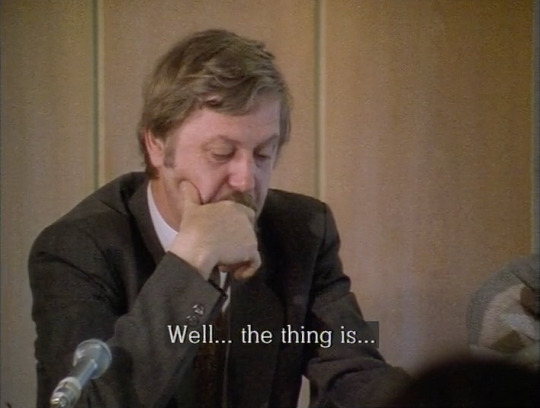
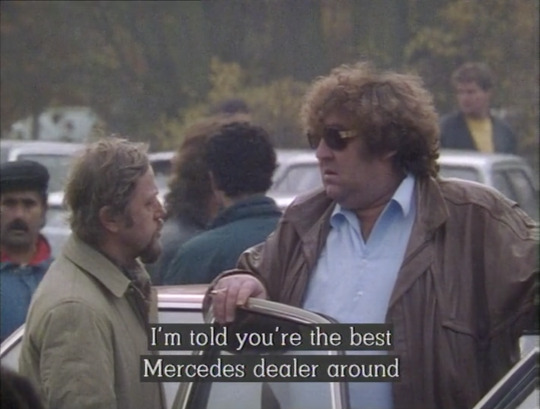

Official Trailer for Cold War
youtube
Intro and Technical Specs
To start, my main fear of writing about films I love is that it will suck the joy out of the film itself by looking at it so closely. I have only written in depth about two films, and thus far, am finding it to be the opposite. When going under the microscope, I am just becoming more aware how great a truly well-made film is when breaking it down.
Cold War may be the most beautiful black-and-white film I’ve seen. The category Amazon has placed it in is “Arthouse Drama”. Amazon Studios also is the distributor of the film. My guess is because it did very well at the Cannes Film Festival and Pawlikowski won the Oscar for his previous film Ida in 2013. Sometimes they get it right. To give some more context, I am very familiar with Ida and studied it for research for making my latest short film. I found it interesting Pawlikowski implemented a particular style similar to filmmaker Paul Schraeder’s book, “Transcendental Style in Film”. One aspect of this style pertaining to Ida is the cinematic framing for the action and not moving the camera until the end. He framed his subjects in a squared 4:3 aspect ratio while leaving lots of headroom, sometimes leaving them in the bottom corner of the frame, which carried over to Cold War. I don’t exactly know why he does this, but I have some theories that I will flesh out within the post in depth. While watching, I immediately noticed the grain in the 4K version. I looked it up and the film was shot with an Alexa digital camera and also a 35mm film camera, so apparently they were able to mimic film grain with the Alexa in post to match. A 32mm lenses was used for almost all the shots. According to Pawlikowski it was because this focal length closely mimics the viewing width of the human eye and allows a wide space of action that can fit around the subject(s) in the frame. Similar to Ida, there is no non-diegetic music in the film (music added outside of the film’s music itself) until the closing credits, reminiscent of the French director Bresson.
Opening in Rural Poland

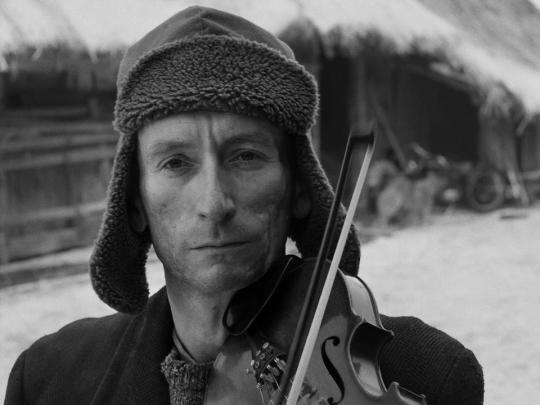
The film opens on the hands of a man playing an instrument that resembles bagpipes, looks handmade and I assume is indigenous to Poland. The camera tilts up to reveal a bright-eyed rural man, and eventually pans over to another interesting looking character playing a violin as they sing together. We soon learn that Wiktor (one of the protagonists) is traveling with two others (Irena and Kaczmarek) and they are recording various forms of folk music unique to the Polish people. Kaczmarek immediately degrades this type of music as “possibly crude” or “too primitive” immediately marking a divide in perspective compared to Irena and Wiktor, who visibly enjoy interacting and recording the villagers’ authentic music.


They soon come to a house where a unique-looking dirty village girl sings a song not accompanied by any instruments. She has deep-set eyes and looks slightly haunted, and the lyrics of the song are about unrequited love. Not a happy song. Wiktor and Irena are enraptured by the raw singing and are recording this. In contrast, Kaczmarek disinterestedly eats soup in the next room, spoon klanking against the bowl, probably interfering with the recording. Kaczmarek is representative of the Communist State for this film, high on bureaucracy and lacking in soul. The song being sung by the little girl is a huge part of the film as a whole. Little do we know (and probably not evident to most who have seen the film) the lyrics tell the story of what happens between the protagonists we are about to follow in the film. The song is called Dwa Serduszka (Two Hearts) and is an authentic Polish folk song like much of the music in the movie. After watching for the first time (I commonly do this) I went online to look up background information and found a very well-made youtube video essay describing the song as being the “Leitmotif” for the film. Leitmotif is a term defined as “a recurrent theme throughout a musical or literary composition, associated with a particular person, idea, or situation”. In this case, the song operates as a direct pointing of what is to happen. The song pops up several times throughout the course of the film, forecasting the fates of the two protagonist lovers, Wiktor and Zula, who are brought together by music.
This “forecasting” I believe goes deeper. It’s as if it is pre-determined. Pre-determined due to the current political environment in Poland and the two characters’ difference in personality and upbringing. Also, most importantly, is because they love each other in a way that seems beyond their control and not a choice, eventually becoming impossible for them to live life without one another. The leitmotif reminds us throughout the film of Wiktor and Zula’s inability to escape their fate, which is already etched in stone by powers beyond their will: Two hearts four eyes Crying all day and night long Dark eyes, you cry because you can't be together You can't be together My mother told me You mustn't fall in love with this boy But I went for him anyway and love him until the end I will love him until the end
youtube
Folk Ensemble
Now we are at a large building which looks to still be in the rural area. Auditions are going to be held here for singers and dancers for a folk ensemble performance. A couple of trucks haul the commoners in and Kaczmarek gives a stately speech to the bunch before cutting inside to everyone waiting to audition for Wiktor and Irena.
We then meet Zula waiting. She elects to audition with another girl, naively, rather than shine in the audition solo. They enter the room to sing for Wiktor and Irena. Wiktor is immediately transfixed and asks Zula to hold on and asks her to sing another song alone. She sings with an authentic, untrained beauty. We also see her feistiness here. It’s obvious Wiktor is smitten and she is marked down to be selected as one of the singers after they exchange a parting look. By now, the framing style of the cinematography is noticeably unique compared to other films. As mentioned in the intro, characters are often framed with lots of headroom and sometimes placed in the bottom of the frame, leaving it mostly open space. My theory on this is that the environment the characters inhabit are shaping their destiny more than the characters’ own free will, therefore their heads are often seen at the bottom with action on top and around them. For example, Communism looms larger than the individual, tamping he or she down (literally) to the bottom of the frame. Not only Communism, but their uncontrollable love for one another, the characters’ upbringing and the people around them with their general wants and needs. These factors shape their present and future more than their own willful, self-determination and I think the filmmaker is aware of this fatalism, yet doesn’t just come and say it because that wouldn’t be interesting. We just see that Wiktor and Zula are never able to comfortably settle anywhere with their love nor escape the love they feel for one another, making their situation impossible due to the circumstances. In Ida, duty to God looms large and so does the characters’ Jewish unknown family past (to only name two) and the shots are framed accordingly as well. On a broad level stepping outside of the film, what’s interesting to me is how much free will do humans actually have and how much is self-determinant? After studying the film closely, this is the deep question (not answer) that I came to that transcends the surface story.
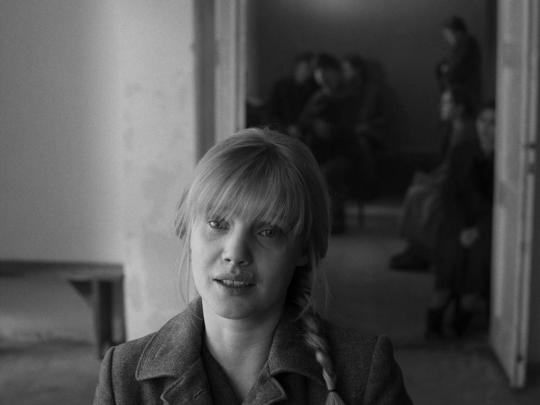
Wiktor watches Zula from a distance outside that evening. Irena then tells him Zula killed her father and did some prison time for it. After rewatching, I suspect that Irena loves Wiktor, and there are a few subtle cues later on that I noticed as well. During private lessons, Wiktor curiously asks Zula what happened between her and her father while Wiktor plays scales on the piano and she matches the notes with her voice. Zula says her father tried to be sexual with her so she stabbed him. It is a very matter-of-fact and short answer. Wiktor doesn’t say anything and continues playing the piano. I’ve thought about this scene more so than any other scene after rewatching. I think it is because of the dialectical nature of Zula saying she stabbed here Dad because he tried to have sex with her, one of the darkest things you could imagine, then the slight humor of Wiktor’s reaction while seamlessly transitioning back to the softness of the piano and her soft voice syncing. Wiktor is very watchful, internal, reserved, most likely from a more refined family and musical background. Zula is tough, spirited, tenacious and has lit a fire in Wiktor. Wiktor is tall and dark-haired. Zula is short and blonde. Opposites!
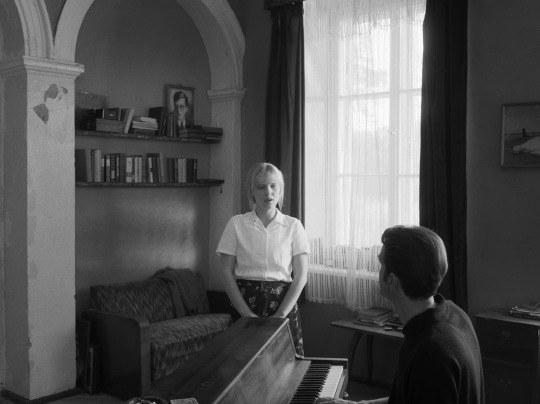
It is now time to perform for a large audience in a theatre. Wiktor conducts. Zula and about 20 other girls in Polish folk attire sing the leitmotif song that was sung by the young girl earlier. The group sings beautifully. Zula shines in front. Even Kaczmarek on the side of the stage behind the curtain seems to be in awe and carefully walks about as if not to disturb the magic.
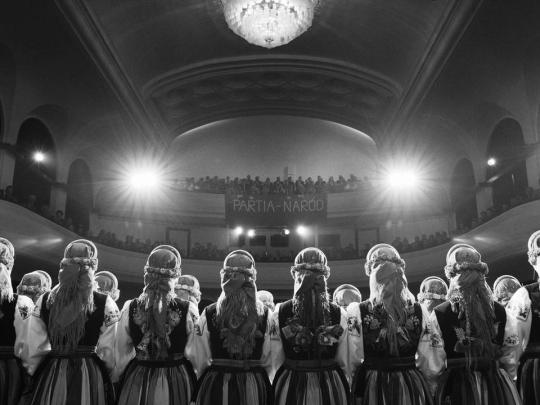
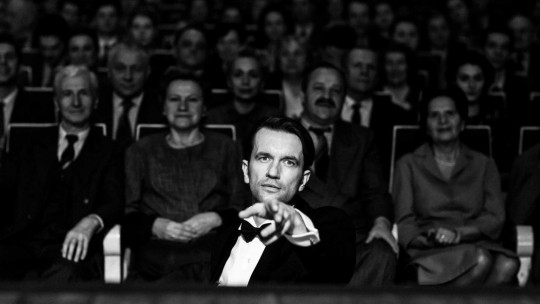
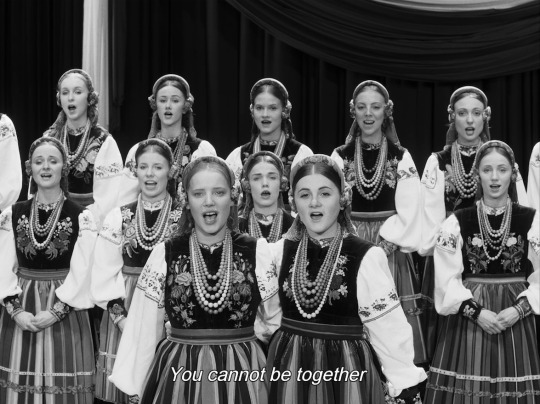
Afterwards there is a reception. Wiktor and Irena lean against a large mirrored wall and everyone else in the room is seen in the reflection. When you first watch it, it takes awhile to figure out the orientation of the room due to the mirrored wall. I think this is the most interesting shot of the film. Kaczmarek then gleefully enters frame and says that the performance was so beautiful, calls Wiktor a genius and says it’s the most beautiful day of his life. He really means it and is the most authentic emotion we see from him in the whole film. Previously, Kaczmarek thought all this “folksy stuff” was foolish. There is a funny moment between the three. Wiktor and Irena are obviously moved by this but not sure how to express it as the stately Kaczmarek leans against the mirror with the two. On a second viewing, one sees Zula in the reflection staring at Wiktor the entire time. The two make love soon after in a bathroom at the party.
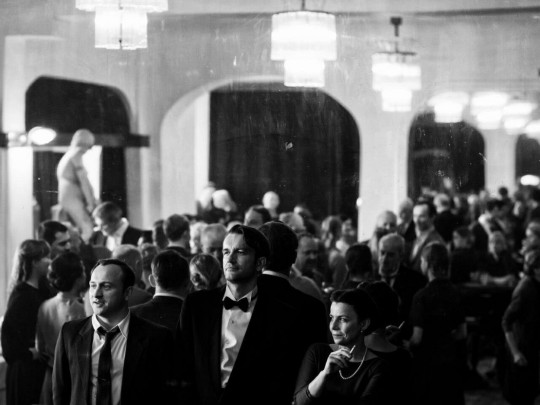
The Ensemble + The State
The performance is so good, now the State wants to get involved and meets with Wiktor, Irena and Kaczmarek. The government wants to turn the repertoire into a “calling card for our Fatherland” and incorporate “Land Reform”, “World Peace” and a strong number about the “Leader of the World Proletariat”. In return the group will be held in high favor, able to travel to other countries to perform, etc. Irena and Wiktor are visibly uncomfortable with this. Irena speaks first and says thank you but the ensemble is about authentic folk art and the rural population doesn’t sing nor understand these difficult issues. Kaczmarek quickly intervenes and calls the man from the state “comrade” and says the ensemble, on the contrary, will do this after given proper direction. Irena stares him down. Wiktor says nothing. The next performance is stained by a huge tapestry of Stalin behind the singing ensemble. The tone now is more dutiful rather than soulful, as if singing a church hymn they are forced to sing. Zula’s face while singing now lacks the life it possessed in the performance before. The State must extinguish all individuality and uniqueness with the goal to homogenize. Irena’s heart looks broken in the audience. Everyone dutifully rises for applause afterwards and Irena walks out. We do not see her again in the film. Everything has changed.
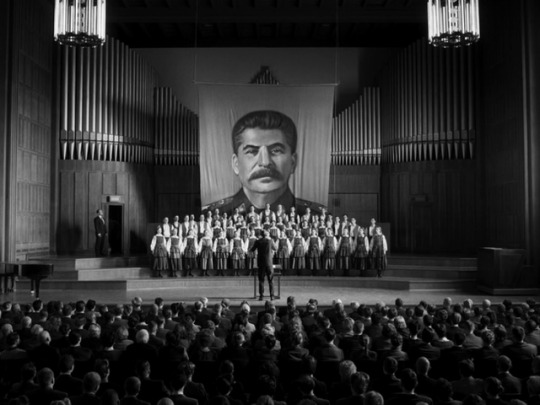

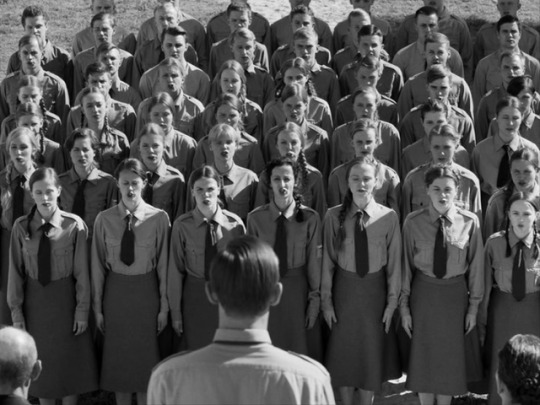
The stuffiness of the singing troops is saved afterwards by a beautiful shot of Wiktor and Zula laying in a golden wheat field together at dusk. Golden?? The film is in black and white but my mind says “golden”. Birds and crickets sing. Tranquility away from the group.

But it doesn’t last long, as they are unable to run from the larger outside factors. Zula soon confesses that she reports on Wiktor to Kaczmarek about their relationship and the things he tells her. She says it’s because she’s on probation for something and assures Wiktor that it’s nothing that will hurt him, but Wiktor gets up and walks off angrily at a loss for words. As mentioned, the scene starts with their eyes closed as if in a dream, beyond the State, but it's inevitable that the state has to enter their relationship at some point, infecting the dream, and will remain a problem for the rest of their lives. Zula calls him a “bourgeois wanker” as he walks away and she reacts oddly by jumping in a nearby river. As soon as she hits the water, Wiktor stops and turns around. She floats in the river and begins singing the leitmotif song.
The next shot is of the two silently sitting together again in the wheat field at nightfall with a campfire going. Zula’s hair is wet. The two just stare at each other and never say a word. What are they thinking? I think Wiktor is thinking that he can not escape her because of his love and that they are stuck! Zula knows this too. This is a type of love that transcends choice. Just like the State, their love controls them. The silent shot in nature cuts to black, then diverges to a busy train station with a brass band as the ensemble leaves to go to Berlin for a show. Kaczmarek gives a stately speech to the group about their trip. Wiktor meets Zula privately in a train car and lays out a plan for their escape once in Germany to go to France. Zula is nervous she will not be able to make it somewhere other than her homeland Poland due to her inability to speak French and lack of experience. I doubt she has any family to rely on, and at the moment has the ensemble in Poland as a decent occupation. Wiktor assures her she has talent to learn and the most important thing is they’ll be together. They kiss. The performance in Berlin is shot very uniform and proper, perhaps further pointing to its newfound soulless rigidity. Afterwards, Wiktor goes to the meeting place to cross the border. Zula remains at the reception with the comrades and Kaczmarek (as if in a trance) and never shows. Wiktor waits until nightfall and eventually stiffly walks across without her.

Defection
Wiktor is now playing piano in a cool jazz night club in Paris with a band. It is 1954. His beard is now grown out a bit and his hair messier than before. He is now in an empty cafe at closing time and speaks French with the waitress. He seems to have assimilated well here. It is revealed he is waiting for someone. That someone is Zula. She eventually walks in and they stare at one another for a few moments. One look at Wiktor while sitting across from her shows how much he still loves her and has missed her. The actor playing Wiktor, Tomasz Kot, really shows this wonderfully. He is very good at being still yet showing so much. Regarding the performances, this is one of the most authentic love films I’ve seen in a long time. And an expert director and writer doesn’t hurt. The film never feels sappy, in my opinion, while simultaneously remaining very romantic. Zula doesn’t show much and stays cold during this scene, but can’t help but ask, “Are you with someone?” Wiktor is. So is she. He asks if she’s happy. She isn’t, but doesn’t say it. Wiktor knows and walks her to the hotel. She says she wasn’t good enough, not as good as him, to make the escape from Poland to Paris. Wiktor says he believes love is enough. Zula coldly kisses his cheek and then stolidly walks away. Wiktor watches her go. But eventually Zula breaks! She turns back around, walks quickly back and they kiss passionately for a few moments before she leaves again. If one just read this and didn’t watch the film, you might think it seems like any other love story you’ve seen a million times. But to me, because of the authenticity of the performances and lack of constant soundtrack music, it really felt great to see these two embrace again. And I think it proves that moments in movies that may look cliche on paper can be pulled off with a skilled filmmaker and actors. Also, there’s only a few angles that the camera covers in this scene and ALL the scenes really! There’s a graceful economy and no superfluous closeups with unnecessary dialogue. And as mentioned, no outside music booms in like most films commanding you to feel something! You feel it because you feel it, not because you’re told to feel it with an over-bearing soundtrack trying to compensate for lack of performance or direction. Wiktor now walks into his apartment, smokes a cigarette alone deep in thought, then gets in bed with his girlfriend. He tells her he’s just been with the woman of his dreams. She doesn’t seem to care and turns around to go to sleep, highlighting the lax and blase nature of their relationship and possibly Paris artist life as a whole. Wiktor then turns off the lamp and looks up at the ceiling in lovestruck thought.
We are now in Yugoslavia in 1955, which looks much more lush than I would’ve imagined Yugoslavia. Wiktor gets off the train to attend a performance of the ensemble. Kaczmarek quickly greets him at the front of the theatre and is oddly cordial and confident in a sharp suit. Once inside, Zula sees Wiktor in the audience and looks startled. Wiktor looks side to side and men are watching him from the aisles. He is escorted away by authorities yet remains adamant to see Zula rather than be afraid of being thrown in jail or hurt. The first time I watched I thought he was definitely going to be thrown in prison. Kaczmarek obviously ordered the men to take him away and send him home in a train before he could see Zula, because of Kaczmarek’s interest in Zula.
Zula and the ensemble are shown singing the leitmotif song now. Zula notices Wiktor is no longer in his seat. Perhaps he was escorted out at the intermission. She sings with a melancholic intensity. The black-and-white contrast is especially beautiful here, maybe more so than anywhere else in the film. There is a black back drop and all of the singers’ alabaster skin glows, as well as their folk costumes.
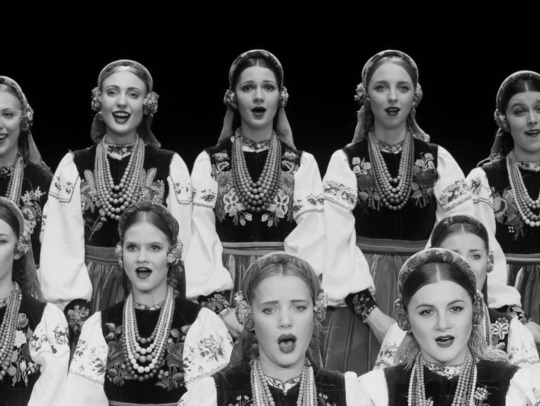
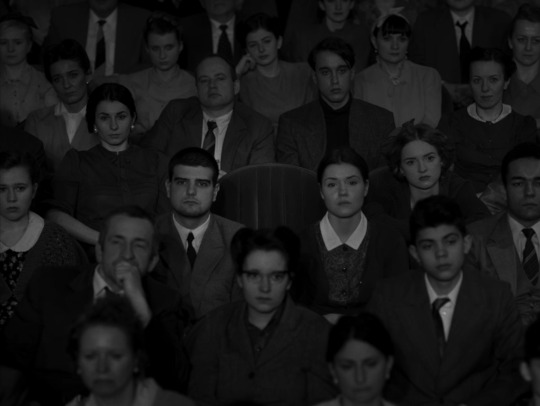
Wiktor is back in Paris now and has gotten work as a Film Composer. Two years has passed since the Yugoslavia concert. While in the middle of working on the soundtrack, the side door of the sound stage opens. Wiktor is spellbound as a smiling Zula is revealed.

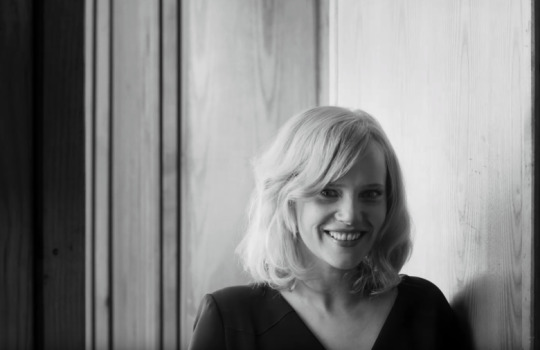
Zula has married an Italian so she could legally move to France. She says the marriage doesn’t count though because it wasn’t in a church. Neither seem worried about it. This time Zula does not hold back her feelings and, obviously, neither does Wiktor. They make love. They ride on a boat down the Seine at night past the buildings and cathedrals. They messily and drunkenly dance alone at a night club in rapture. Heaven for a moment.
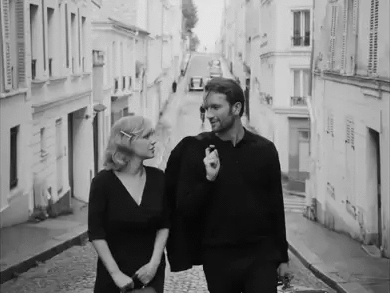

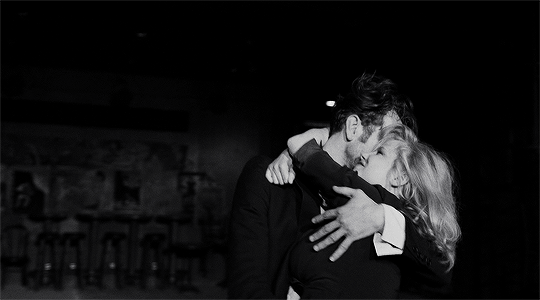
Which begins Zula’s vast transition from the performing rural ensemble in Communist Poland to a solo singer at the Paris jazz club with Wiktor’s band. She sings the emblematic Dwa Serduszka most wonderfully here. Order. Everything in it’s right place. She is luminous as the camera slowly dollies around her, eventually revealing a packed club. Everyone is captivated and still. Then at the end is a lovely moment, maybe my favorite moment of the film, where Wiktor is staring at her intensely and she turns to check in with him and he gives her a nod of approval. It’s almost corny, riding the edge, but is powerful, conveying a silent understanding between the two seeing one another perfectly clearly.
Poles to Parisians
We now are at where Wiktor and Zula live, which looks like a cool version of a converted attic with a Paris view. Juliette, Wiktor’s ex, has translated Dwa Serduszka from Polish to French and Zula is unhappy with the translation, which most likely includes some self-consciousness about her pronunciation. The manner is which the leitmotif song appears here runs parallel to the first step in the descent of the relationship in Paris. Zula is defensive and anxious about the Parisian artistic circle Wiktor has introduced her to and she drinks to ease the anxiety of feeling inferior. Wiktor tells her not to because she is “charme slave” as they say, alluding to how everyone has a narrative role and label in these circles. Zula is becoming difficult and insecure. Wiktor is becoming caught up in the scene and ignorant of Zula’s dramatic change of environment.
The film director at the party looks Zula up and down when they arrive. Wiktor allows this without rebuke, most likely due to the nature of the sexually-lax Parisian art culture. Everyone is beautiful and chic at the party. Zula immediately goes for the drinks. She then sees Juliette and approaches her abruptly (yet with restraint for Zula), subtly challenging her French translation of Dwa Serduzska. Juliette calmly explains her reasoning according to the lyrics’ metaphors. It’s obvious Juliette sees through what’s happening in the situation here.. Juliette’s part is small but the actress is excellent and conveys a lot. She eventually mentions how the transition to Paris must’ve been a shock...the cafes, cinemas, shops, restaurants. Apparently Juliette sees this shock more than Wiktor does. Zula tries to play it cool here but you can see she’s flustered. This is a game she’s not used to playing. She then retorts that her life in Poland was better.
Wiktor is talking to someone and looks over and sees Zula and the Film Director sitting closely, flirting. Zula glances back over at him to see if he cares, but Wiktor stays put. Then later she aggressively confronts him about giving her story “more color”. It is apparent now that he has enhanced her Polish story to seem more dramatic in order to captivate his French friends and colleagues. Wiktor shrugs this off. Zula’s vibe is not carefree and cool like the rest of the party with her straightforward, intense rawness which creates an isolation for herself. She sits in the bathroom now alone, drinking from a bottle, talking to herself in the mirror. She calls Wiktor a jerk, but then says she loves him. She calls herself an idiot at one point. She continues to talk in the mirror as if to console herself. And I can’t help to mention how much she looks like a young Gena Rowlands here. It reminds me of the 1968 film Faces, which is also black and white. They look so much alike, and both fantastic actresses that are blonde, voluptuous and troubled.

Gena Rowlands in Faces (1968)

Joanna Kulig in Cold War (2018) Wiktor, unknowingly and excitedly, opens the bathroom door and says that they’re all going to the Jazz Club now.�� Zula says she’s a bit sad and wants Wiktor to come in the bathroom with her, but he ignores this and says let’s go. She takes a moment to herself and then it cuts to the club. She looks miserable and wasted sitting at the bar. As we go, I am still noticing the framing I mentioned at the beginning with the subject at the bottom, but for this shot she really seems low!

Her melancholy is interrupted by an upbeat, American song (”Rock Around the Clock Tonight”) and she gets up reinvigorated and starts dancing enthusiastically with a few different guys. The camera goes handheld and is the messiest camerawork of the film (a good messy). She eventually gets sloppy and gets on the bar and almost falls and people drunkenly cheer as Wiktor exasperatedly watches.
youtube
We then see Wiktor carrying her into their room. Zula says he is no longer a man in Paris like he was in Poland, and says she and the director get along well in attempt to get under his skin further. He then sits alone in the dark and smokes a cigarette.
It now cuts to Zula in a sound studio singing into a mic in French. I don’t speak any French, but her accent and pronunciation feels correct, but her spirit is muted...and we soon see one reason why. Wiktor’s voice ominously interrupts her over a speaker behind glass in the recording booth. Now the shot is on him and he looks disheveled and dark and tells Zula they only have 40 minutes left and not to blow it. There is a deep hate in his eyes we haven’t seen yet, perhaps retribution for calling out his manhood and their recent relationship woes. An engineer and the film director are also in the booth. There is just a bad energy in the room and anyone that’s ever tried to perform anything would be able to detect how difficult it would be to bring a great performance here. The music starts back up and Wiktor looks down as if disappointed right before she starts singing.


We are at a listening party now for Zula’s record at the French Director’s apartment. Zula is standing in the middle of the room alone, listening intently as several others sit around in the background drinking champagne. Dwa Serduszka plays, but now in French. It’s okay but not great. It doesn’t have the soul that it had before in Polish. I’m trying to put my finger on it, but the French seems a little stiff and the vocal track seems extra-produced. Too loud and too clear when mixed with the band’s instruments and it’s just not what it was before like the first time at the jazz club, for example. Again, this leitmotif song is also a metaphorical indicator for the stage in the relationship. She looks over at Wiktor who is cooly leaning on the wall off to the side (maybe too cool) and gives Zula a nod similar to his nod after the jazz club performance. But this nod doesn’t have the effect it did then and seems oddly forced. The record playing here in this posh Paris apartment compared to the Polish rural girl singing at the beginning of the film is night and day. It’s obvious why, if you think about it. They’ve taken a folk Polish song, translated it to French for a rural Polish singer, then recorded and produced it in a slick Paris sound studio under difficult conditions. How could the quality not suffer a bit?! Another example of the larger outside obstacles making it impossible for them, even in a free society like Paris, France.
It cuts to them now walking home afterwards. Immediately it’s apparent Zula is unhappy. Wiktor recognizes this but apparently didn’t know while at the party. As they pass a fountain next to the street, Zula throws the record in <splash> yet continues to mostly hold her sadness in, which has become more of a depression at this point. Assimilating is one thing, but they have gotten into this habit of holding back and not being up front, maybe due to the social circles they run in now. Zula cooly mentions that the French Director has fucked her well 6 times and "not like a Polish artist in exile,” which causes an eruption in Wiktor (what she wanted) and he slaps her.
This is strange to mention but, technically, the slap doesn’t sync with the sound. Lol. I watched this part 3 or 4 times to make sure and it just doesn’t (unless there was a lag in the internet connection). Maybe nobody else notices this, but I’ve had to edit-sync slaps, kicks and punches before many times on this very computer and immediately saw something didn’t look/sound right. After the hard slap, Zula raises up and says, “Now we’re talking”, which is sarcastic but also the truth. Often one needs a crisis moment to break out of a behavioral habit and apparently the French translation broke the camel’s back. The next day Wiktor frantically goes to the Director’s apartment looking for Zula. He stomps through the rooms looking for her. The Director then says she went back to Poland. Wiktor slowly walks out of the apartment with a terrified look on his face. Wiktor has become unhinged and plays maniacally on the piano at the Jazz Club. The other band members just stop playing and look at him as he bangs on the keys in isolation. There is some slight comical levity here for a couple of seconds due to the look on the clarinet player’s face. You assume Wiktor has lost his job. He is now miserably pumping coins in a phone booth for talk time to find out where Zula is in Poland. Afterwards, Wiktor goes to what I assume is an embassy. A Polish man at a desk tries to dissuade him from leaving Paris and going back to Poland. You can see the Eiffel Tower outside the window as the man asks Wiktor why he would ever want to leave this place. He says Wiktor doesn’t exist anymore to Poland because he left and let down all the young people he worked with. The man takes a drink from his cup and reacts as if he’s spiked it with something strong, perhaps how he’s able to get through his job. He then mentions there is a way Wiktor can go back if he truly regrets what he has done.
The Exiles Return

It is 1959 and we see Zula back in Poland on a dreary, crowded train with peasants. Soldiers whistle at her as she walks on a snowy road. She has come to visit a very broken, gaunt Wiktor who is being held prisoner by the military for being an exile. He says he has to be here for 15 years and got off lucky. Zula gives the guard what I assume are cigarettes which buys them 10 minutes alone.
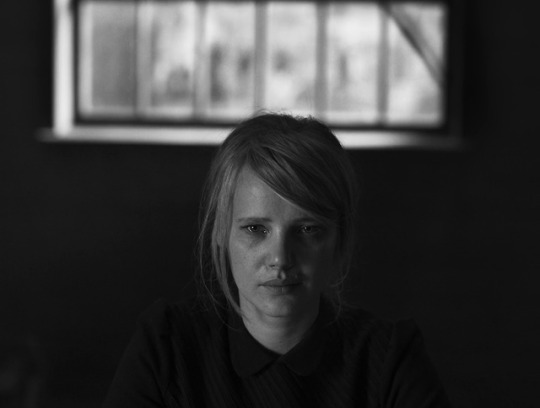
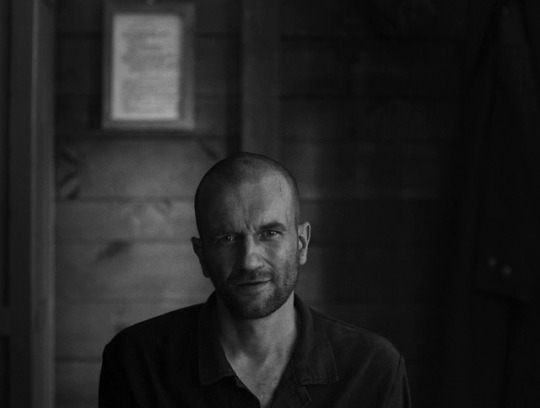

His right hand has been beat severely. They kiss and Zula says she will wait for him. Wiktor tells her to find someone else, but Zula says she will get him out.
Cuts to 1964, 5 years later. A performing Zula is on stage singing a ridiculous Latin-infused song with a black wig on, resembling a late Judy Garland. She looks overweight and drunk with her comical, sombrero-wearing band. We now see an older Wiktor backstage with Kaczmarek who is holding an unhappy, despondent child. Kaczmarek doesn’t look like he’s aged a bit and still has a detached soullessness about him. With Kaczmarek, you wait for him to be rude or mean but he is not. He always stays at a steady, robotic hum of cordiality. It is revealed Wiktor can no longer play music because he can no longer use his right hand. It is also now apparent that Zula married Kaczmarek in order for Wiktor to be released. Zula now comes off stage and walks quickly toward them but drunkenly falls down. She manages to rapidly get up and falls directly into Wiktor’s arms, completely disregarding Kaczmarek and her son. They go off to the restroom together and sit on the floor staring at one another. Zula pulls off her wig, perhaps finally able to shed this horrible identity she's had to create to survive.
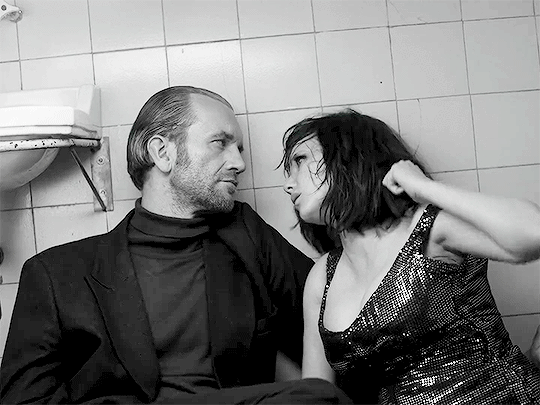

She asks him to get her out of here...for good.
The two take a crowded bus and get dropped off on a country road next to a lovely field. They look slightly rejuvenated but stolid.
Early in the film, Irena and Wiktor sat in the van while Kaczmarek took a walk to take a pee. Kaczmarek then aimlessly walked into the ruins of this old church. He looked around, then left...point being we’ve seen this place before. And earlier, even Kaczmarek’s face showed a certain amount of reverence for this old church and felt the power it gave off. Wiktor and Zula now enter this same church. There is a circular hole in the ceiling, perhaps so God can see them.


They now kneel with a candle lit in front of them on an alter with a row of white pills. They have a brief, simple marriage ceremony. They both have a glow to them. They cross themselves and mention God. They ingest the pills.

They kiss.
They then sit on a bench at dusk and look out into the field, holding hands, quiet.
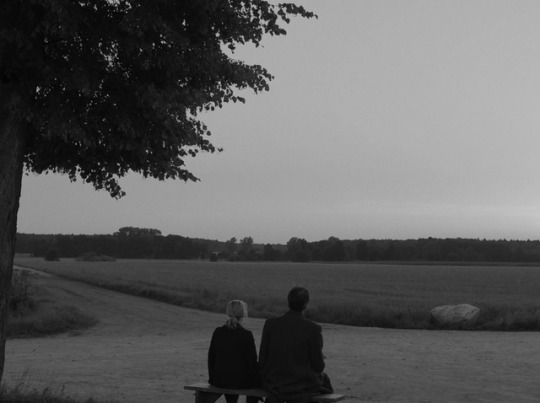
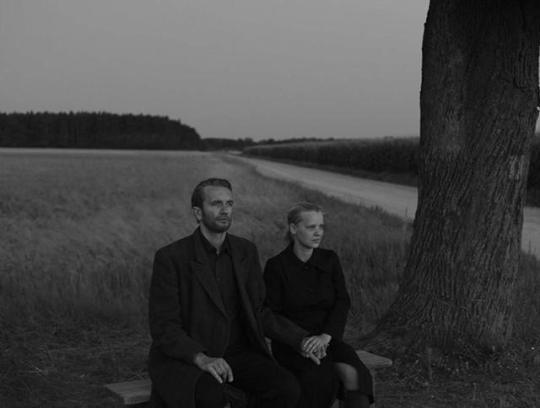
You can hear the insects and an occasional bird chirp. Both have dark circles under their eyes. It’s so beautiful yet so sad. Zula then says, “Let’s go to the other side. The view will be better there”. They stand and go, leaving an open frame. A gentle gust blows the wheat from behind where they were sitting. Perhaps God’s sigh...
This last time I watched, the ending really got me...and is powerful now as I write about it. As mentioned in the intro, Pawlikowski’s last film Ida incorporated a particular style. Pawlikowski never moved the camera until the end of that film, so when he did the viewer would be raised up in a transcendental way as the first external music came in, lifting us from the real world for a few moments. I think he did the same thing here with Cold War in a different way. The moment of transcendence for this film comes at the end also but not with the movement of the camera but with the movement of the wheat behind the bench before cutting to black. This film is high on realism, but this gust is something otherworldly, therefore a powerful contrast from the stark, real world tribulations previously in the entirety of the film up to this point. This is what makes it so heartbreaking and beautiful and poetic all at the same time. And also, for a moment, the viewer might weigh whether the fate of Wiktor and Zula is so horrible after all. “for my parents” appears before the credits, pointing to the fact that the story is based on the filmmaker’s parents’ true experience during that time period. Bach’s Goldberg Variations comes in and you know it’s Glen Gould when you hear the humming, which I don’t necessarily like but it doesn’t ruin the mood. Bach was also used for the ending of Ida and is also the only non-diegetic music used for Cold War.
In conclusion, I think every great film has to have a surface story that one can follow and then a large idea hidden within that story (or as a result) to meditate on which includes something deep about the human condition. With some films, one has to work to find out what that larger idea is. For future posts, I may try to specifically focus on this “larger idea” rather that breaking down the entire film. This often appears as a question, not an answer, and Cold War does this masterfully.
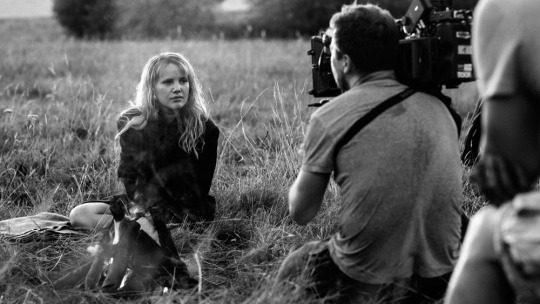
3 notes
·
View notes
Text
GCF in Saipan- A Rant as of August 2018 (Posted December)
(Out in December since I wanted to get a more objective view on things and to edit it slightly. This is just as a memory record anyways so)
When I made this blog, it was meant to be a blog to rant about anything Bangtan that interested me. However, I recently encountered one of the most frustrating, interesting, and baffling two days of my life and I needed to address the cause of this with a rant (that I doubt people will read). The cause: Jungkook’s GCF in Saipan.
WARNING: THIS IS ALL IN GOOD FUN. I claim no rights to what is true or not. Don’t take this too seriously please. Will have Koomin/Jikook references.
To start it off, I don’t like real people shipping. I don’t really care if others do it (as long as they remain sane and logical) but I personally didn’t enjoy doing it for one reason: I don’t know them personally, so it isn’t any of my business. I enjoyed their interactions with each other platonically, using what they gave us upfront as fuel, and whatever else that might be happening to purely up to them. For BTS, I never before cared much for shipping, and just enjoyed every interaction as it is.
Then I watched GCF in Saipan, the catalyst to my descent into a brief insanity. What I can say about Saipan is that it is a theorist haven, perhaps why I’ve become so interested now. By “theorist”, I mean NOT REAL, and my opinions should not be taken as fact. These are all just observations that I personally took from the GCFs.
Perhaps what I should say before going into Saipan specifics is that I watched Tokyo in my early days as a fan. I did not know the context of the song, I did not know Jungkook or Jimin well, so I didn’t think much of it. Of course, I acknowledged it was fairly romantic in setting, but I took it to be interpreted either platonically or romantically, and even now I don’t think too much of it. The video itself has a personal meaning to me: reciprocal love, any shape of it available, with little accents and layers that can be tilted and shifted for the viewer’s own interpretation (as all art). I don’t have too much to say about Tokyo itself, because of how straight forward it is. Saipan is the one that makes no sense if I tried to take it in upfront. I’m not very good at reading behaviors, hence my inability to see what others see as “moments”, but I have done some (very unprofessional) editing before and I absolutely love art analyzing, which the GCFs very clearly are to me.
For this, I will be isolating Saipan in a fairly tight bubble, with little unrelated topics. I won’t be including much outside Jungkook’s art (except in the skeptic area). Some previous GCF mentions/comparisons, some outside views strictly on the films as well will be referenced in the rant itself. Not going to include any deep reading into their overall relationship, mostly an analysis of the GCF.
I watched Saipan (at this point after being a fan for long enough to care) first thinking that something was off. Something wasn’t harmonious with each other. The second time I watched it, I realized the dissonance was between the film and the music. Together, it wasn’t coherent, which is different than all of his work so far. Tokyo, Osaka, even USA though being equally promo-related, they all had more to build upon meaning-wise, the perspectives matched within the film. Saipan’s song both in mood and in subject clashed with the film from beginning to end. Of course, all in my opinion.
Here is the song:
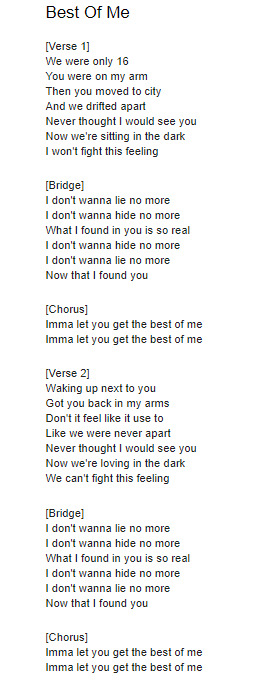
Now, before I go any further, I had an intensive discussion with a mutual on twitter, who is a multi-kpop non-BTS stan. She doesn’t keep up with Bangtan, but she likes some of their songs and is a casual listener. She is also somewhat experienced and knowledgeable in video editing and had very interesting input for the factor of “film sound”, the information from a document which she paraphrased. This was her input through the DMs:
“The Pacific Cinematheque has stated that there two types of sound in film, Diegetic and Non-Diegetic. Diegetic is the sound that we would also experience in real life. Non-Diegetic is any sound we don’t experience in real life like dramatic orchestrated songs or musical score or sound effects like the screeches in the shower scene Psycho.”
“So why do directors use sound? Well (and here it comes) it is to do any of the following 1. add mood 2. add atmosphere to a film. How? By adding these soundscapes that Accent or add another Layer of meaning to the film. The filmmaker wants the audience to perceive the scenes in a specific way, and sound/music leg scenes be seen in the specific way that the director intended. Silence in a film can represent something very important or a turning point. Music, specifically in film, has various uses, but most commonly it is used to “guide the emotional response of the audience”. Music is the clue in scenes, it’s like a huge signpost directing (pun cause the filmmaker is a director anyways off track sorry) the audience on how to react to a scene.”
“So basically what I am saying is that of course Jungkook is aware of the music he’s using in his gcfs, and he’s also aware of the reaction he wants from the films. He used that song because he wanted a specific reaction from the audience, he wanted us viewers to see what his intentions are and at this point I’m insane too cause all I’m thinking is that he wants us to react to Jimin and to focus on that.”
(I may or may not have told her multiple times through out my discussion with her that I feel like I’m going insane. I calmed down before writing this though, for the sake of making any sense and neutrality.)
These are just the basics. If you still aren’t convinced how important a song is in context to a film, then remember: before Jungkook even began making the GCFs, he was doing mainly covers of songs. And he said, specifically to the fans, that the lyrics of his chosen songs are important. He usually chooses them for a reason (what that reason could be, up to the viewer, since he doesn’t outright explain the choices).
So we established that first, Jungkook most likely chose this song with actual thought and intention put into it (again, take that intention with what you may).
Of course, what interested me was Jimin’s parts. Mainly because he is my son (even though I am fairly younger than him), and also because of the teaser Jungkook released shortly before dropping Saipan. Truth be told, I wasn’t really expecting the silly dance nor the punches to be included, as I thought that Jungkook only posted that to show Namjoon and the fans what was going on in the “behind the scenes” video Namjoon posted the day before. Perhaps a little blooper insight. So yes, I was surprised that the scene was included at all, much less becoming a gap-clip repeating between alternating clips of the group and other members. I was also surprised at the amount of time Jimin was shown, as after USA being a very equalized group video, I was expecting the same from Saipan. Similarly to USA, it was very work-oriented and promotional, and also both (definitely USA as from Namjoon’s Vlive) were most likely commissioned by Bighit.

Jimin’s dominates the bridge. By dominate, I mean he is the only one with a completely exclusive part in this particular GCF. Verse 1 was Taehyung, verse 2 was Hoseok, and the choruses are a mix. Jimin appears the most not only through adding up all the small clips, but because he takes up two solid blocks of the song, both with the same context and lyrics. The reason why the it’s hard for me to link the others with their individual parts is because of the way they were shot, the clips that were chosen, all very aesthetically pleasing but difficult to find depth or flow in. Jimin’s parts almost had a story line. This is important to me because of the lyrics, which we shall visit now.
First the meaning of the song. John K. in an interview: He describes the bouncy track’s meaning as “[about] evolving through young love, admitting to past mistakes and committing to giving someone the best possible version of yourself.”
To be honest, this song is not as ambiguous to me as There For You, Troye Sivan, Tokyo GCF. Sure, Troye Sivan is a gay artist, and the song lyrics are directed at a boy. But the lyrics themselves I do think can be taken in any shape of love. For Best of Me, this is not the case. I think Verse 2 is the clearest reason for this:
Waking up next to you
Got you back in my arms
Don't it feel like it use to
Like we were never apart
Never thought I would see you
Now we're loving in the dark
We can't fight this feeling
While I’m a staunch believer in lyrics being universally interpreted and available to all versions of personal view (take Osaka as an example, which is another fairly straightforward GCF), to make it simpler for myself right now and with the tinfoil hat on, I’ll stick with what the song can be most basically understood: lovers who are loving in secret, but wants to be let free.
Here comes a bit tinfoil (not really shippy, but more reading into what it could mean artistically. Purely subjective interpretation):
Now, without going into the ship or anything at all first, here is my artistic interpretation of Jungkook’s editing: the lyrics may be directed at Jimin, but I personally can also intemperate that Jimin in the video embodies the lyrics, or the lyrics embody Jimin in the video. Either way works for me. This is interpretation in the same way people interpret the smile of Mona Lisa (purely individualistic), and it doesn’t rely too much on Jungkook’s true intentions here. Again, I don’t claim any of this as the true meaning, as to me there is no true meaning needed for me.
In the video, Jimin shows the rawest actions. He barely pays attention to the camera half of the time, and when he does, it’s for the sake of the cameraman (Jungkook). This can be seen when in the second bridge part, he shows Jungkook his own camera just off screen, and during the second chorus, he high-fives Jungkook, just off screen once more. I believe Jungkook also chose these parts intentionally, especially the sneeze during the second bridge that he zoomed in on. No matter if the purpose was just to clown Jimin (also possible), it still leads an interesting narrative for me (I know I repeated this multiple times, but no, this may not be the intentions of Jungkook, and it is my own view on it as an art form). The lyrics “I don’t wanna hide no more” building up to “Imma let you get the best of me” was in sync with the way how Jimin bursts from a serious expression into a silly dance, with the silliness continuing later after the chorus and verse 2 into the second bridge. He is true to his actions, letting go of inhibition, essentially not hiding, lying, nor acting anymore. All genuine, silly, honest moments, such as the sneezing, the off camera action, etc.
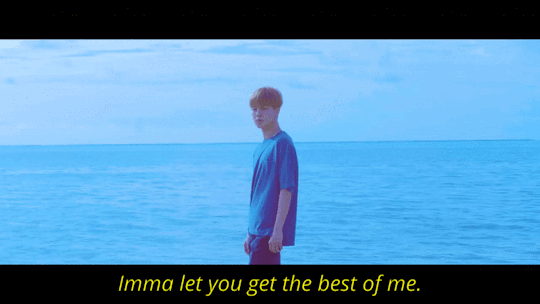
The editing for the dance part is interesting too. As I said before, I wasn’t expecting it, so it was interesting when it seemed Jungkook added a separate track and layered other clips on top of the silly dancing. This one might be a bit of a stretch, but I can see it like the clips of the groups randomly were “hiding” the silly dancing. No particular meaning needed really, just a technique used in editing that, to me, matches the lyrics in an unintended way. Those were just my thoughts when considering the possibilities of the lyrics, and the visual is pretty cool in the narration. I know from experience that it’s much easier to layer clips (BTS eating) over a longer clip (Jimin dancing) rather than cut them individually to fit around each other. So that’s just a neat observation lol.
Artistically speaking, Jimin is the only solid narrative and character within the video because there seems to be an actual correlation between the actions he does chronologically with the lyrics given for him. I find it interesting how he and the lyrics embody each other as the video went on. Again, my personal take on a work of art.
Now here’s the ultimate tinfoil-kinda-shippy part of my post. ALL PURE SPECULATION.
This video can be conceptually all about the “hidden”. Looking at this as a GCF, in comparison to his two earliest works, it is a lot more promotional, like USA (I actually have some thoughts on USA and Bangtan as well, and may think about writing a post for it. It’s not gonna be as bad as this one though).
Perspective of GCFs before Saipan:
Onto the subject of music perspectives, Jungkook so far as established a trend of using the perspective within the songs to be directed at the people starring in it, most noticeably in Osaka, with the way the lyrics were directed/about either Jimin or Taehyung’s roles/characters in the film from a first person perspective speaking. Tokyo as well with the last few lines of “running running just to keep my hands upon you”, showing the camera in the perspective of being behind Jimin as he got farther away with the first person pronoun. USA with the “we” point of view, which is then including the film’s perspective as part of the “we”, especially noticed when Jungkook goes to shake Zedd’s hand. I assume then that Jungkook uses the music choices as a way to direct to the people or to include himself in it at some points, rather than being a passive outside third person view. Now that GCF in Newark is out, that is even more obvious, though I also find Newark to be a diverging path in his medium exploration, so the perspective is more centered around himself rather than those around him. GCF in Saipan was made with the same format as those before it so my thoughts on its techniques are the same (I will be ignoring Newark for now since it’s format is so radically different, as well as the fact that its creation doesn’t affect his previous works).
This is important in the case of Saipan being very dissonant with the the perspectives of the film and of the song. Beyond my personal artistic perspective above (which, in my interpretation, I believe is another layer to the narrative, as multiple meanings within art is always the best). Say that the lyrics are from the point of view of the camera as a character in the film (Jungkook), which so far it has been for most of the GCFs. USA’s perspective made sense in that it was a group song, and it’s about a "we”, including Jungkook, reminiscing the old days. Generally equalized screen-time for each member, first person plural perspective, you get it. Sure, the tone and mood of it was off, but at least the perspective made sense. Saipan’s perspective and mood both don’t make sense. As a whole, Best of Me as a song choice doesn’t make much sense, given the perspective of it. Very different to USA, which I previously thought Saipan was going to emulate for reasons already stated.
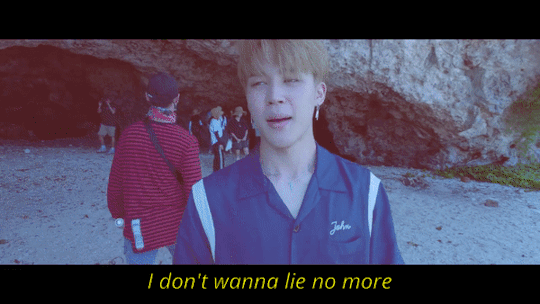
Saipan is biased to Jimin based on the film and lyric placement, as previously stated, and so narrative-wise, it is also Jimin-biased. The song choice itself is also strange in that Saipan’s song is very clearly not a group song. It is a song with a “me” and a “you”. During the bridges, it’s even more clear how the “me” and “you” works. With the camera being the perspective, the “me” is the singer speaking, and the “you” (if we base this off of how Jungkook’s use of perspective works thus far) is directed at whoever is on screen. The same way Tokyo was directed at Jimin, and in Osaka, Jimin and Taehyung appeared whenever the lyrics were directed at them (Taehyung appearing at “he’s taking your side of the bed” so he is the subject of the “you” in that set of lyrics, similar to how “running running just to keep my hands upon you” in Tokyo, the “you” was Jimin. Again, Jungkook uses the camera as part of the narrative, hence the use of communication between camera and “actor”).
Well, you may ask, why isn’t anyone else’s part in the going to be the same? Especially Hoseok’s part, which to be honest, I’m surprised no one mentioned much? They mentioned how the song had questionably romantic lyrics, and everyone freaked out about how beautiful Hobi was in the video (same though) but his part coincided with those questionable lyrics I mentioned earlier. Why doesn’t that indicate Jungkook proclaiming his undying love for Hobi? Well, the main reason is most likely “selective context”. That part by itself could allude to that, but as a whole, the film focused on someone else. So this is an example of taking parts of something to make a different whole. That’s why the structure of Saipan felt different than those before it. Tokyo was linear, Osaka was alternating between two, USA was group, and Saipan is... weird.
So, during the bridges, the “me” is the “I don’t wanna hide no more, I don’t wanna lie no more” and the “you” is “’cause what I found in you is so real”. Depending on who the camera’s perspective is, this can be taken in many different ways. However, USA makes me believe that the camera itself is really Jungkook (as I always assumed so) and not the fans, a third person, etc. If the “me” is Jungkook, and the “you” is Jimin - well, I did sort of lose my sanity for two whole days.
In short, for an entire two days I was convinced Jungkook was in love with Jimin or at least had some sort of romantic connection with him in some way. Not that they were in a relationship, I was feeling something much too sudden for me to give it labels, and much too isolated to consider any “big picture”. And I felt like I was going insane because of how out of the blue my own reaction was. As I said before, I’m no shipper. So it was shocking and a little terrifying when I was so convinced. (I am calmer now, and have a relatively more neutral stance on the pairing once more, thankfully).
The main reason why I was so convinced previously was because of one reason: with input from my perspective analysis, I believe the GCFs are from Jungkook’s point of view (as we all believe). With the song choice and the clips chosen, it was a surprise to me when I thought about the film more carefully. I don’t ship BTS because to me, those are outside opinions on what’s happening, behavioral analysis videos, coincidence theories, etc. Sure, they can be interesting, sometimes cute, but I don’t see any need to support or pay too much mind to it. With GCFs, it was different because this was not outside perspective. This was Jungkook. This was his video, that he filmed and edited and spent time on. Like with his covers, as he had told us before, they (could) have meaning. They (could) tell a story, that may change the way you view his work. So what exactly could he be trying to tell us has been interesting for me to interpret. Of course, I still don’t think it matters much to have an absolute “True Meaning” unless he gives out one, and even then, art is appreciated in many ways, with so many facets and personal subjective connections. I don’t think I’m right, just that it’s what I perceived. And for me, it took me off guard how disconnected from the rest of the film the bridges were. They were so different in mood, in style, the bias, the commutative narrative going on. I couldn’t understand what Jungkook was saying, unlike all GCFs previous where it felt more coherent and I could at least somewhat figure out his message. And while perhaps Saipan simply doesn’t have a message, that’s hard to believe with this ongoing narrative.
This basically comes down to the opposing ideals in my mind. On one hand, I would hate to assume anything about someone I don’t actually know, especially when it’s something so personal and not-my-business. On the other hand, I would hate to dismiss anything that could be meaningful from an artist who put a lot of thought and handwork into a project of their’s. Something my art teacher of four years told me before “don’t be scared of being wrong about reading into an artwork, because they want you to see the things you are seeing”. Perhaps it’s all on purpose without any personal meaning? Maybe. I’ll stick with the “meaningful narrative but not necessarily romantic” for my own safety.
Who knows? Here’s some counterclaims to cheer you up and help me regain sanity.
Speculative counterarguments with responses and more doubt and speculation (my irl friend helped to come up with some of them, just in case):
Counterclaim:The song is meant to be taken platonically, with more focus on literal meaning on the chorus parts “Imma let you get the best of me”, aimed at either the members or at the fans. The song may also be promotional due to it having the same name as one of their own song. This means the entire video was focused more on promo (like the end “Summer Package” text).
Response: Jungkook does care about lyrics, and even with promo possibly being the main focus (which I do think it is a big part of it), I don’t think he will choose a song with the same name at random. However, it is possible he wanted to choose a song with the same name (promo, personal reason, who knows) and also thought the lyrics applied minimally (and liked it musically). As I said before, I am a big “lyrics can mean anything” person, so taking romantic lyrics and using them for platonic or other situations is something I can see happening. So yeah. This is definitely possible.
Counterclaim: Jimin is focused on for the bridge part because of the lyrics “I don’t wanna lie no more” tying to his “Lie” solo from Wings (my friend is the one who came up with this one)
Response: This one I find there is a low possibility of. Mostly because even if that was the case, why would Jimin dominate the entire bridge, including the other lyrics? Jungkook could have easily edited in other members, like the mixture he does for the verses and especially the choruses. Just put in a little shot of Jimin at the lie part and move on. So, this is unlikely (along with the fact that I really doubt Jungkook chooses songs and clips based on that) Which leads to the next counter:
Counterclaim: Jungkook very simply enjoys filming Jimin most, due to familiarity and Jimin being more comfortable with it. He’s at the bridges for content symmetry and also because there were simply more footage of him because of ease and accumulation. He sees Jimin as a very fun and goofy person, so he used the funny clips. There is no deeper meaning behind Jimin’s shots.
Response: Sure, I guess. This comes down to “how personal are the GCFs for Jungkook?”, which I would personally say very much so but I digress. They’ve already proven that Jungkook enjoys pointing the camera Jimin a lot in recent interviews (5th army mainly). I still think the most questionable parts of the video was how Jimin was singled out at the bridge parts and what the lyrics could possibly mean along with that, but I won’t rule this one out for the sake of accumulating other possibilities, no matter how much I believe in Jungkook’s artistic vision and my innate enjoyment in getting random meanings out of everything for fun. Again, platonic intention is possible to me. You may disagree, and that’s completely fine. I’m still neutral about this, because hey, anything is possible. So don’t get too carried away.
Counterclaim: So what about Osaka, if you consider the lyrics literally? Does that mean Taehyung, Jimin, and Junkook are in a love triangle?
Response: Honestly, I would like to do a personal analysis of Osaka in a separate post in the future (if I have time). Here’s a taste of what I think of it in a shorter answer to Osaka in general: it is actually possibly my favorite GCF, reasons being that I adore the the little no-music cuts Jungkook did, and also because Vmin is one of my favorite relationships in Bangtan. Due to sentimental reasons, Vmin has a very special place to my heart. Osaka feeds that part of my soul I suppose. Now, about the lyrics and the supposed love training happening, the thing is that Osaka is very different from Saipan in terms of use of perspective, use of cuts, screen time, etc. Personally, I see Osaka as a film about the maknae-line as a whole, with a smidgen of Jimin-bias. I don’t see the film about a love triangle, especially not a romantic one. Hope I can make a separate post detailing this.
Now that I’m done, I want people to not overthink it too much (unlike me). Of course, Saipan for me personally was just incredibly interesting because of how off and strange it felt to me in comparison to the other GCFs, but in regards to shipping, don’t invest too much emotionally. Enjoy what you get from all members, get attached to a pair maybe. But don’t let it completely take over your life. I like the speculative agnostic approach best (similar to my favorite blogger in regards to KM). Sure, Saipan had me go insane for two days straight out of the blue, but coming down from the insanity was a learning experience, especially returning to my neutral stance, which I enjoy greatly.
Making this more clear once again: this is not a post exposing Jungkook or anything. I do not claim any of this as his real thoughts. In fact, I don’t even believe any of what I’ve interpreted entirely. Those to me are “possibilities” to be thought, but not to be declared as truth. I think I’m probably wrong about a lot of this. Since again, why else do people still question what exactly Mona Lisa was smiling so mysteriously about? (she knows something we don’t, as the critics say).
If you want a more impartial opinion on GCF in Saipan, I recommend this director's outlook. I recommend using a non-biased mind to read this non-biased outlook. It is very interesting by itself as a professional's opinion. Please do not take the post as fodder for ships nor the definitive meaning of Saipan (if there even was one, who knows). We will never know for sure unless Jungkook ever decided to explain it if he wishes to. And if he never does, that’s fine too. Distinguishing what is reality, what is our reality, and what is someone else’s reality is extremely important.
Thanks for reading if you did! Hope it wasn’t the most awful thing ever. Tell me what you think about my interpretation, my opinions, counterarguments and counter-counterarguments. I do like KM as a ship now in some way, but again, all in good fun, and I don’t really want to give the relationship any labels. I don’t really want to take any of this too far other than a long rant to let out some parallel universe thoughts.
This was made also before I really got into any KM speculation, and it’s all very interesting. But I currently don’t really want to form a solid opinion on anything, or read too deeply. Maybe I will, one day. Or not. Since like I said, I’m not good at reading people.
It’s very likely no one will even see this, but as a personal record of my thoughts, it feels good to put them down.
💦 ☔💦
9 notes
·
View notes